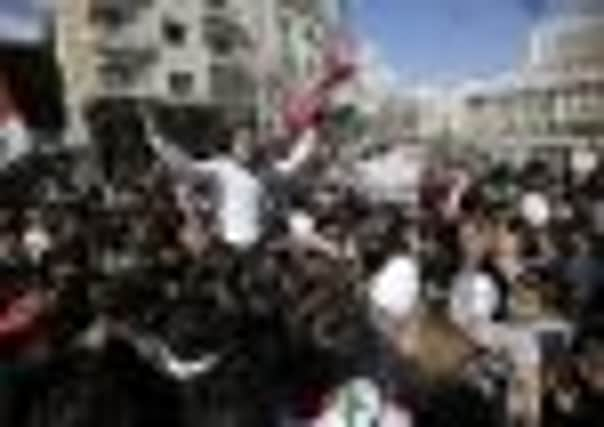Syrian dialogue ‘a challenge’ to Assad, says peace mediator


Lakhdar Brahimi, the joint UN–Arab League envoy to Syria, said the proposal by Mouaz al-Khatib, the president of the opposition coalition, “has opened the door and challenges the Syrian government to fulfil its often-repeated assertion that it is ready for dialogue and a peaceful settlement.”
“This initiative is on the table and will be on the table,” Mr Brahimi told reporters in Cairo following talks with Arab league chief Nabil Elaraby.
Advertisement
Hide AdAdvertisement
Hide Ad“We believe that if a dialogue begins in one of the UN headquarters, at least initially, between the opposition and an acceptable delegation from the Syrian government, it will be a start for getting out of the dark tunnel in which Syria is placed,” he added.
In a statement on Friday, the opposition’s main umbrella group, the Syrian National Coalition, said it would not allow Mr Assad or members of his security services to participate in talks to end the crisis.
It did not rule out dialogue with some members of his ruling Baath party, saying it welcomed talks with “honourable people” from all parts of society who “have not been embroiled in the crimes against the Syrian people.”
Meanwhile, Syrian parliament speaker Jihad Laham told fellow lawmakers yesterday that dialogue is the path that must be pursued under a political agenda Mr Assad proposed in January to end the nation’s 23-month-old conflict.
“All Syrians must work within the framework of this program to resolve the crisis in the country,” Mr Laham said, pleading to “all Syrians, from all sects and orientation, to confront terrorism facing us.”
Syrian prime minister Wael al-Halqi admitted that sanctions and rebel attacks “are beyond the capacity and the ability of any country to bear.”
He said the economic blockade imposed by the EU, the United States and some Arab states has had a “negative impact” on the health sector, although he did not elaborate.
Rebel attacks, he added, have damaged 2,500 high schools and caused serious power outages, reducing electricity distribution by up to 60 per cent nationwide.
Advertisement
Hide AdAdvertisement
Hide AdHe also blamed a shrinking oil supply – which he said now meets around 40 per cent of the country’s needs – on rebel attacks on oil refineries.
Earlier yesterday, Syria’s electricity minister, Imad Khamis, told the state news agency, Sana, that electricity had been restored in most parts of the Syrian capital and that power will gradually reach the south as technical teams were trying to restore power completely. He blamed the blackout on an unspecified fault in high-voltage lines.
The power outage plunged Damascus into darkness late on Saturday and affected much of southern Syria.
The Syrian capital’s 2.5 million residents have grown used to frequent power cuts as the country’s nearly two-year-long conflict has damaged infrastructure and sapped government revenue. A similar blackout struck the same areas on 20 January. The government blamed that outage on a rebel attack.
An explosion in Damascus killed one person and wounded another yesterday, a security official said. It was unclear what caused the blast in Abbasid Square, which sits on the western side of the neighbourhood of Jobar, where rebels from the suburbs have been trying to push in to the capital and clashing with government troops for more than a week.